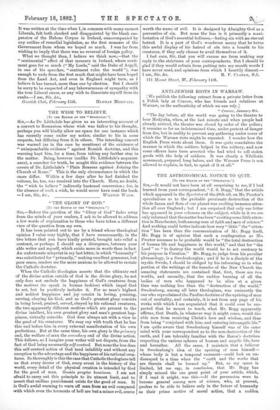"THE GLORY OF GOD."
[TO THE EDITOR OF THE "SPECTATOR."]
SIR,—Before the question of the "Glory of God" fades away from the minds of your readers, I ask to be allowed to address a few words of explanation to those who have taken a different view of the question from my own.
It has been pointed out to me by a friend whose theological -opinion I value very highly, that I have unnecessarily, in the two letters that you have kindly printed, brought into relief a contrast, or perhaps I should say a divergence, between your able writer and myself, which exists more in words than in fact. An unfortunate misprint in my last letter, in which " humanity " was substituted for "primarily," making excellent grammar, but poor sense, renders me the more anxious to be allowed to restate the Catholic doctrine.
When the Catholic theologian asserts that the ultimate end of the divine action outside of God is the divine glory, he not only does not exclude the happiness of God's creatures from the motives (to speak in human fashion) which impel God to act, but he positively includes it. For as man's highest and noblest happiness and joy consist in loving, praising, serving, obeying his God, and as God's greatest glory consists in being loved, praised, served, obeyed by his rational creatures, -the two apparently different motives which are present to the -divine intellect, his own greatest glory and man's greatest hap- piness, virtually coincide. God does always act with a view to the good of his creatures. We may say with truth that he has this end before him in every external manifestation of his own perfections. But at the same time, his own glory is the primary -end, the welfare of man the secondary end of the divine action. This follows, as I imagine your writer will not dispute, from the fact of God being necessarily self-centred. But none the less does -this sell-centred action of God tend infallibly and without any exception to the advantage and the happiness of his rational crea- tures. So thoroughly is this the case that Catholic theologians tell .us that every decree of God, every event in the history of the world, every detail of the physical creation is intended by God for the good of man. Omnia propter h,ominem. I am not afraid to carry out this principle to its utmost limit, and to assert that endless punishment exists for the good of man. It is God's awful warning to warn off man from an evil compared with which even the torments of hell are but a minor evil, scarce
worth the name of evil. It is designed by Almighty God as a preventive of sin. But none the less is it primarily a mani- festation of God's essential holiness,—hating sin with an eternal hatred. It is a part of God's wondrous mercy that he turns this awful display of his hatred of sin into a benefit to his creatures, if they only choose to avail themselves of it.
I feel sure, Sir, that you will excuse me from making any reply to the strictures of your correspondents. But I should be glad if they would refrain from putting into my mouth words I have never used, and opinions from which I heartily dissent.—
I am, Sir, Svc. R. F. CLARKE, S.J. 111 Blount Street, W., February 14th.


































 Previous page
Previous page